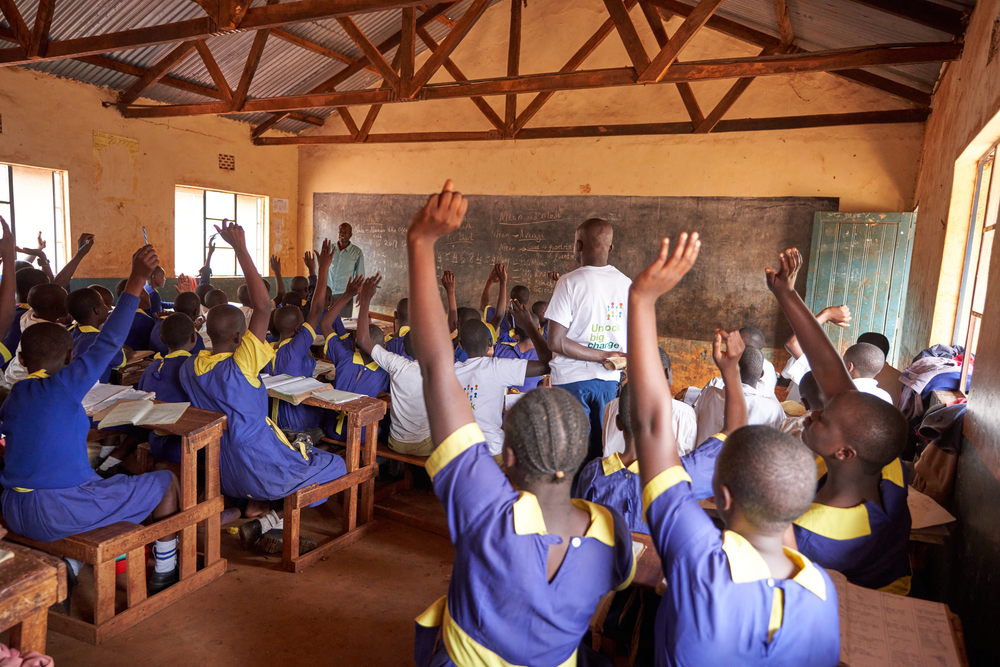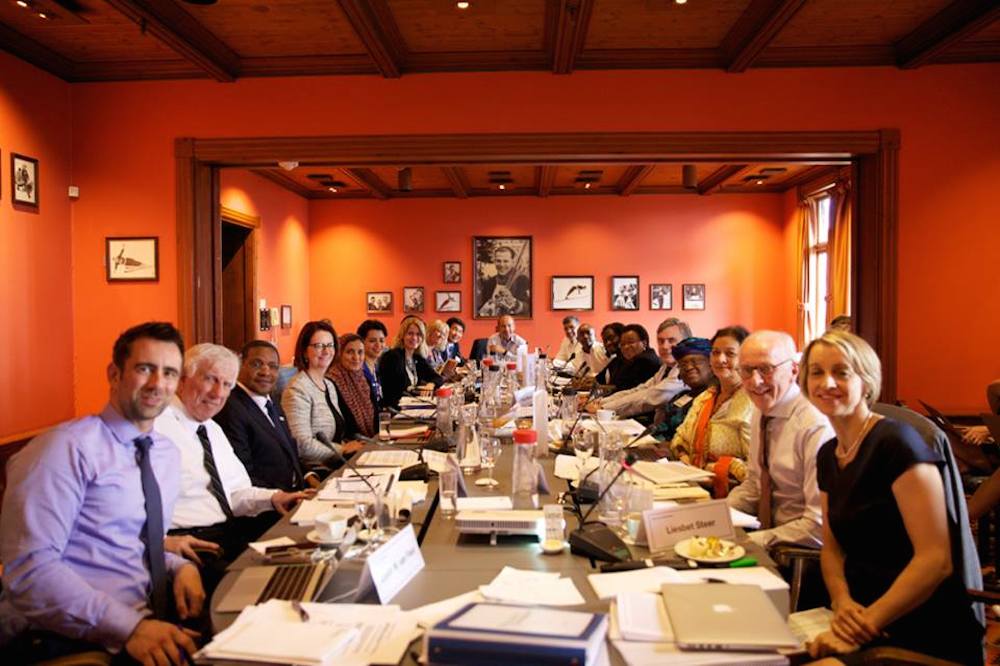
Education Commission

The Education Commission is working to improve education around the world. Find more information about the structure, objectives and work of the commission.
What is the Education Commission?
Officially known as the International Commission on Financing Global Education Opportunity, the Education Commission is a group of world leaders, policy-makers and researchers who are working together to tackle the lack of funding for education.
Inadequate financing for education has left 263 million young people out of school and hundreds of millions without quality learning opportunities.
The commission spent a year gathering evidence and analysing research before delivering its report title The Learning Generation to the United Nations in September 2016.
Why was the Education Commission set up?
Launched in September 2015, the commission aims to reverse the lack of financing for education that has left 263 million young people out of school.
Education targets are among those set by the United Nations in their Sustainable Development Goals as crucial to improving health, economic growth and security for individuals and wider nations.
Without action, the world faces the risk of failing to close the gap between developed and developing nations for generations to come. Education’s share of government budgets has been declining in a number of countries, despite the growing needs.
Additionally, international assistance to education has declined in recent years. What financing there is for education is allocated inefficiently across and within countries.
Writing in the Guardian, Norwegian Prime Minister Erna Solberg, co-commissioner of the commission, said: “Reaching all children and young people with quality education may be a daunting challenge but we can make significant progress if decision-makers step up to the plate, together with teacher unions, international organisations, the private sector, civil society and others.”
Who is on the commission?
Five former prime ministers and presidents and three Nobel Prize winners are among 20 world leader, academics, business leaders and economists who sit on the commission.
It is supported by the government of Norway and Prime Minister Erna Solberg and is chaired by Gordon Brown, former British Prime Minister and UN Special Envoy for Global Education. It is co-convened by Prime Minister Solberg alongside President Michelle Bachelet of Chile, President Joko Widodo of Indonesia, President Peter Mutharika of Malawi and the Director-General of UNESCO, Irina Bokova.
Nobel Prize winners on the commission are Kailash Satyarthi, Founder, Bachpan Bachao Andolan; Amartya Sen, Professor, Harvard University; and José Manuel Barroso, former President, European Commission.
The commission also includes Felipe Calderón, former President, Mexico, Julia Gillard, Chair, Global Partnership for Education and former Prime Minister, Australia and Anthony Lake, Executive Director, UNICEF.
What does the commission aim to achieve?
The Education Commission’s remit was to examine ways to reverse the lack of financing for education around the world. For a year, it explored exploring how – over the next 15 to 20 years – education could lead to greater economic growth, better health outcomes and improved global security.
It did this by bringing together the best research and policy analysis about the actions necessary to increase investment in education that have a positive impact on economic and social development.
The commission aims to secure increased, more effective investments and contribute to the mobilisation of new partnerships to achieve these aims.
The commission’s stated objectives were:
- To bring together the best evidence from around the globe about what works to expand and improve learning opportunities
- To agree on an investment case and agenda for action
- To inspire and persuade leaders – at all levels and sectors – to action
What about the youth voice?
The commission has a Youth Panel that contributed to the report. Its 16 members included four of A World at School’s Global Youth Ambassadors – Naglaa Fathy, Hellen Griberg, Benedict Joson and Mohamed Sidibay.
Mohamed was a child soldier in Sierra Leone; Naglaa is from Egypt and has been involved in training teachers in new approaches in slum areas; Benedict from the Philippines is an advocate for education; and Hellen, who was born in Zambia and raised in Norway, is a child rights campaigner.
What are the commission's main recommendations?
The commission’s report said bold action and radical funding could see every child in the world in school and getting a quality primary and secondary education by 2030.
It said its proposed measures will increase the number of qualified high school graduates in low and middle-income countries from 400 million to 850 million by 2030 and to 1.2 billion by 2040. The numbers in the lowest-income countries will rise from just eight million to 80 million.
The overall aid needed would be just $35 per child – less than $1 per week by 2030 – to get countries back on track for universal learning.
The commission proposed a four-stage plan to achieve this:
- STAGE ONE: All countries to adopt the reforms of the fastest improvers – the 25% of education performers around the world. Instead of only one in 10 schools being online, all schools would go digital.
- STAGE TWO: Every country to see education as an investment in the future and raise spending in low-income countries from 3% of national income today to 5% of national income.
- STAGE THREE: Mobilise the combined resources of the international institutions. No country committed to reforming and investing should be denied the chance to deliver universal education due to lack of funds.
- STAGE FOUR: A “Financing Compact” between developing countries, donors and multilateral institutions – under which overall aid will rise to $35 a year per child by 2030, significantly less than $1 a week.
The commission said low- and middle-income countries will need to increase domestic spending on education from about $1 trillion in 2015 to $2.7 trillion by 2030, or from 4% to 5.8% of GDP.
International finance for education will need to increase from $16 billion per year today to $89 billion per year by 2030 – but that will account for only 3% of the total funding needed.
Commission chair Gordon Brown said: “I am confident that if we combine investment and reform, and mobilise domestic and international finance in a more coordinated way, we can be the first generation in history in which every single child is at school.
What has the Education Commission done so far?
The commission meet for the first time in September 2015 and then held a series of meetings and talked to a huge number of people and organisations.
There were 138 civil society consultations in more than 80 countries on six continents. They included 55 NGOs, 39 networks, 18 universities, seven research institutions and Theirworld. People and organisations responded to six key questions translated into six languages – English, French, Spanish, Arabic, Chinese and Russian.
The commission also received and analysed research papers and inputs from more than 30 research partners in 15 countries.
It produced an in-depth report titled The Learning Generation, which was delivered at the United Nations on September 18, 2016. UN Secretary-General Ban Ki-Moon said in advance the UN would act upon the recommendations. He said: “I look to the commission to provide a roadmap, based on innovative, sustainable and practical solutions, to overcome the barriers to lifelong education and learning for all.”
The commission said that, after delivering its report, it will spend the next year spreading the word about its findings and recommendations, inspire and motivate reforms in the financing and delivery of education, and structure partnerships to deliver the recommendations.
The Pioneer Country Initiative was launched in November 2016 to support countries turning the commission’s recommendations into action. Fourteen countries in Africa, representing low-and middle-income countries and a cross-section of geographies and linguistic zones, were selected in the initial wave: Botswana, Chad, Congo, Côte d’Ivoire, Ethiopia, Gabon, Ghana, Malawi, Mozambique, Namibia, Nigeria, Tanzania, Tunisia and Uganda.
In July 2017, Education Commission Chair Gordon Brown and Commissioner Shakira Mebarak made an urgent appeal for world leaders to put education on the agenda at the G20 summit in Germany. The G20 leaders then committed themselves to advancing the International Finance Facility for Education, a breakthrough initiative which could make it possible to fund universal education.
In late 2017, the commission launched the Education Workforce Initiative. This aims to bring fresh thinking to help teachers and support staff deliver quality education that meets this century’s demands.
By the start of 2018, the recommendations outlined in The Learning Generation had been endorsed by over 20 developing countries. Representatives from the 14 African Pioneer Countries have been trained in the “delivery approach” – a planning and implementation methodology to achieve better and faster education results.
Next resource
